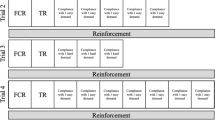Abstract
First Step to Success (FSS) is a “manualized” intervention with documented effectiveness in reducing problem behaviors for young children at risk for school failure. This study is a preliminary analysis focusing on the role of performance feedback from FSS coaches on the fidelity with which teachers implemented FSS. Three typically developing students (2 kindergarten and 1 first grade) and their respective teachers served as participants. Student behavior and teacher implementation fidelity were assessed using a nonconcurrent multiple baseline design across student/teacher dyads, in which a no coaching baseline was followed by a performance feedback condition. The baseline phase showed modest levels of implementation fidelity and initial low levels of problem behavior followed by gradually increasing trends. A relation was demonstrated between coaching feedback and improved implementation fidelity. In addition, improved fidelity was associated with improvements in student problem behavior. Implications are drawn for clinical application of FSS and other “manualized” interventions.
Similar content being viewed by others
References
Arkoosh, M. K., Derby, K. M., Wacker, D. P., Berg, W., McLaughlin, T. F., & Barretto, A. (2007). A descriptive evaluation of long-term treatment integrity. Behavior Modification, 31, 880–895.
Barber, J. P., Crits-Christoph, P., & Luborsky, L. (1996). Effects of therapist adherence and competence on patient outcome in brief dynamic therapy. Journal of Consulting and Clinical Psychology, 64, 619–622.
Carter, D. R., & Horner, R.H. (2007). Adding functional behavioral assessment to First Step to Success: A case study. Journal of Positive Behavior Interventions, 9, 229–238.
Codding, R. S., Feinberg, A. B., Dunn, E. K., & Pace, G. M. (2005). Effects of immediate performance feedback on implementation of behavior support plans. Journal of Applied Behavior Analysis, 38, 205–219.
DiGennaro, F. D., Martens, B. K., & McIntyre, L. L. (2005). Increasing treatment integrity through negative reinforcement: Effects on teacher and student behavior. School Psychology Review, 34, 220–331.
Duchnowski, A., Kutash, K., Sheffield, S., & Vaughn, B. (2006). Increasing the use of evidence-based practices by special education teachers: A collaborative approach. Teaching and Teacher Education, 22, 838–847.
Fielding, L., Kerr, N., & Rosier, P. (2007). Annual growth for all students, catch-up growth for those who are behind. Kennewick, WA: The New Foundation Press.
Golly, A. M., Stiller, B., & Walker, H. M. (1998). First Step to success: Replication and social validation of an early intervention program. Journal of Emotional and Behavioral Disorders, 6, 243–250.
Greenwood, C. R., & Delquadri, J. (1995). Classwide peer tutoring and the prevention of school failure. Preventing School Failure, 39, 21–25.
Greenwood, C., Kratochwill, T., & Oxaal, I. (2008). School-wide prevention models: Lessons learned in elementary schools. New York: Guilford Press.
Gresham, F. M. (1989). Assessment of treatment integrity in school consultation and pre-referral intervention. School Psychology Review, 18, 37–50.
Gresham, F. M. (2004). Current status and future directions of school-based behavioral interventions. School Psychology Review, 33, 326–343.
Horner, R. H., Salentine, S., & Albin, R. (2003). Self-assessment of contextual fit in schools. Available from http://measures.earlyadolescence.org/media/upload/ContextualFitinSchools_9081581.pdf
Joyce, B., & Showers, B. (2002). Student achievement through staff development (3rd ed.). Alexandria, VA: ASCD.
Luborsky, L., McLellan, A. T., Woody, G. E., O’Brien, C. P., & Auerbach, A. (1985). Therapist success and its determinants. Archives of General Psychiatry, 42, 602–611.
March, R. E., Horner, R. H., Lewis-Palmer, T., Brown, D., Crone, D., Todd, A. W., et al. (2000). Functional assessment checklist for teachers and staff (FACTS). Eugene, OR: Department of educational and Community Supports, University of Oregon. Available from www.pbis.org/common/pbisresources/tools/FACTS.doc.
McIntosh, K., Borgmeier, C., Anderson, C. M., Horner, R. H., Rodriguez, B. J., & Tobin, T. J. (2008). Technical adequacy of the Functional Assessment Checklist: Teachers and Staff (FACTS) FBA Interview Measure. Journal of Positive Behavior Interventions, 10, 33–45.
Merrell, K. W., Ervin, R. A., & Gimple, G. A. (2005). School psychology in the 21st century: Introduction, principles, and practices. New York: Guilford Press.
Miller, S. J., & Binder, J. L. (2002). The effects of manual-based training on treatment fidelity and outcome: A review of the literature on adult individual psychotherapy. Psychotherapy, 39, 184–198.
Mortenson, B. P., & Witt, J. C. (1998). The use of weekly performance feedback to increase teacher implementation of a pre-referral academic intervention. School Psychology Review, 27, 613–627
Noell, G., Witt, J., LaFleur, B., Mortenson, D., & LeVelle, J. (2000). Increasing intervention implementation in general education following consultation: A comparison of two follow-up strategies. Journal of Applied Behavior Analysis, 33, 271–284.
Noell, G. H., Witt, J. C., Slider, N. J., Connell, J. E., Gatti, S. L., Williams, K. L., Guhon, G. J. (2005). Treatment implementation following behavioral consultation in schools: A comparison of three follow-up strategies. School Psychology Review, 34, 87–106.
Sterling-Turner, H. E., Watson, T. S., & Moore, J. W. (2002). The effects of direct training and treatment integrity on treatment outcomes in school consultation. School Psychology Quarterly, 17, 47–77.
Vollmer, T.R., Sloman, K.N., & St. Peter-Pipkin, C. (2008). Practical implications of data reliability and treatment integrity monitoring. Behavior Analysis in Practice, 1, 4–18.
Walker, H. M., Golly, A., McLane, J., & Kimmich, M. (2005). The Oregon First Step to Success replication initiative: Statewide results of an evaluation of the program’s impact. Journal of Emotional and Behavioral Disorders, 13, 163–172.
Walker, H. M., Kavanagh, K., Stiller, B., Golly, A., Severson, H. H., & Feil, E. G. (2001). First Step to Success: An early intervention approach for preventing school antisocial behavior. In H. M. Walker & M. H. Epstein (Eds.), Making schools safer and violence free: Critical issues, solutions, and recommended practices (pp. 73–87). Austin, TX: Pro-Ed.
Walker, H. M., Seeley, J. R., Small, J., Severson, H. H., Graham, B., Feil, E. G., et al. (in press). A randomized controlled trial of the First Step to Success early intervention: Demonstration of program efficacy outcomes within a diverse, urban school district. Journal of Emotional and Behavioral Disorders.
Walker, H. M., Severson, H. H., Feil, E. G., Stiller, B., & Golly, A. (1998). First Step to Success: Intervention at the point of school entry to prevent antisocial behavior patterns. Psychology in the Schools, 35, 259–269.
Walker, H. M., & Sprague, J. (2006). Early, evidence-based intervention with school-related behavior disorders: Key issues, continuing challenges, and promising practices. In J. B. Crocket, M. M. Gerber, & T. J. Landrum (Eds.), Achieving the radical reform of special education: Essays in honor of James M. Kauffman. Mahwah, NJ: Lawrence Erlbaum Associates.
Walker, H. M., Stiller, B., Golly, A., Kavanagh, K., Severson, H. H., & Feil, E. G. (1997). First Step to Success: Helping children overcome antisocial behavior: Implementation guide. Longmont, CO: Sopris West.
Wickstrom, K., Jones, K., LaFleur, L., & Witt, J. (1998). An analysis of treatment integrity in school-based behavioral consultation. School Psychology Quarterly, 13(2), 141–154.
Wilder, D., Atwell, J., & Wine, B. (2006). The effects of varying levels of treatment integrity on child compliance during treatment with a three-step prompting procedure. Journal of Applied Behavior Analysis, 39, 369–373.
Author information
Authors and Affiliations
Additional information
The authors extend appreciation to Dr. Hill Walker for his guidance and feedback in the conducting of this research. Preparation of this article was supported in part by the US Department of Education CFDA 84.32P (Grant H32P040006). Opinions expressed herein do not necessarily reflect the position of the US Department of Education, and such endorsement should not be inferred.
Rights and permissions
About this article
Cite this article
Rodriguez, B.J., Loman, S.L. & Horner, R.H. A Preliminary Analysis of the Effects of Coaching Feedback on Teacher Implementation Fidelity of First Step to Success. Behav Analysis Practice 2, 11–21 (2009). https://doi.org/10.1007/BF03391744
Published:
Issue Date:
DOI: https://doi.org/10.1007/BF03391744




